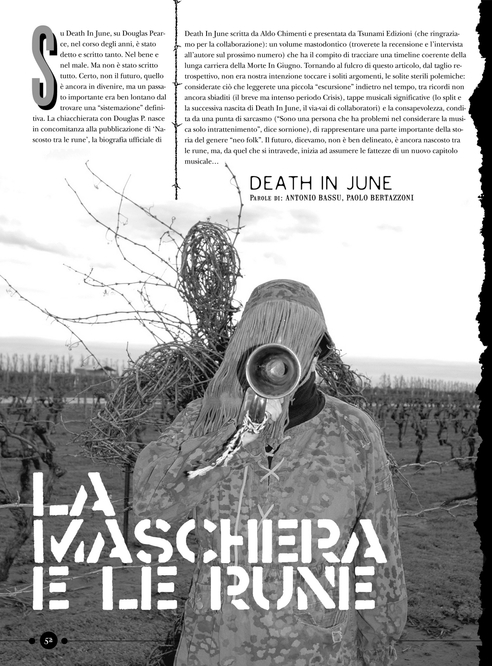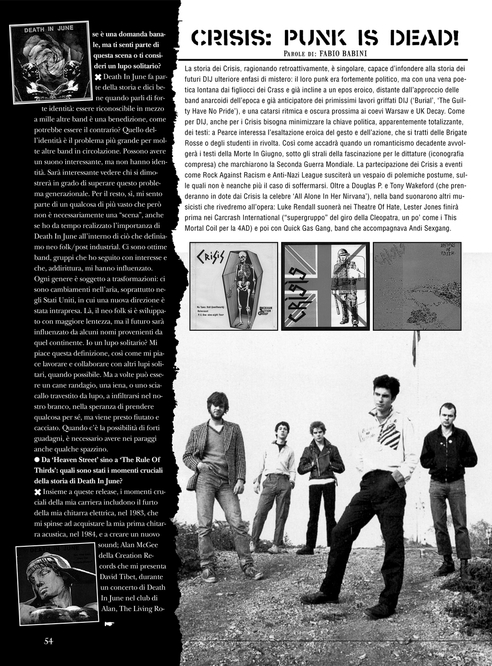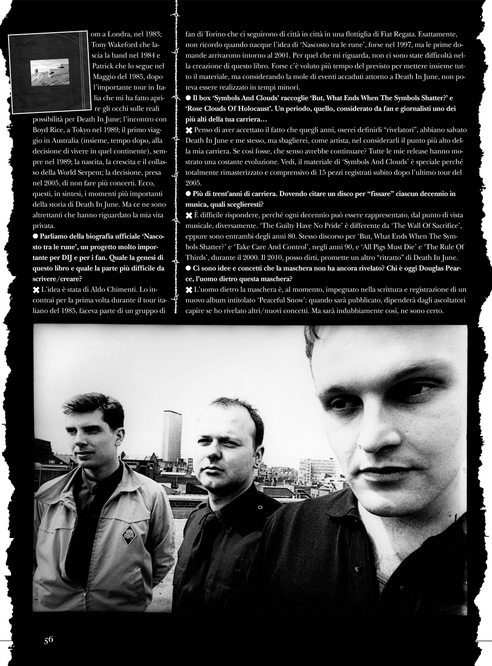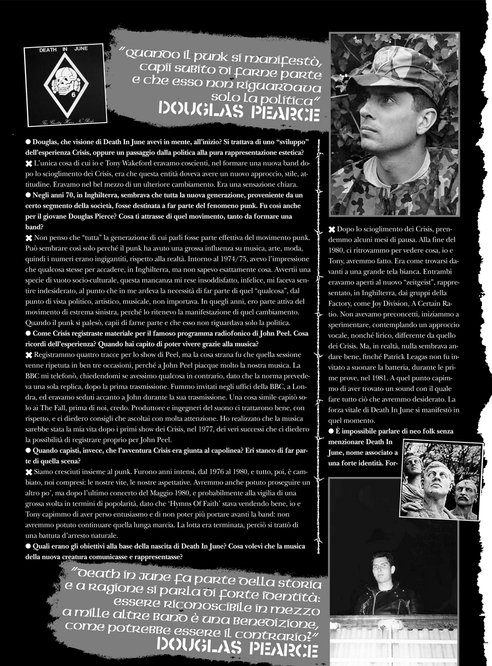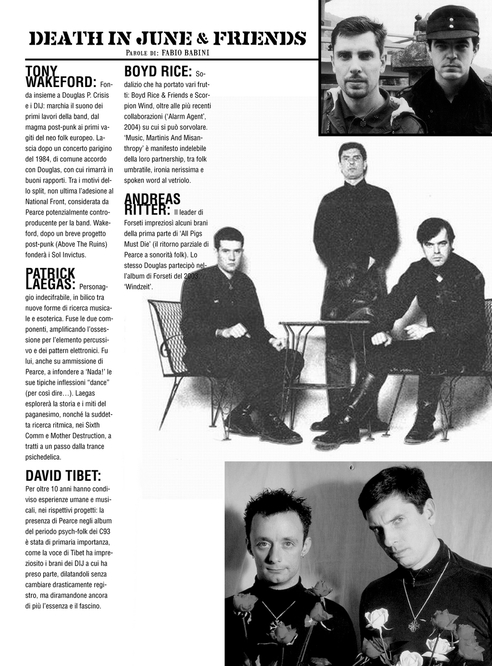Douglas, we would like to begin by heading back in time to the beginning of this long journey: what was the initial founding vision of Death In June? At the very creation, was it just a extension of Crisis experience? Or was it an important passage from politics to aesthetics?
The only real thing that Tony Wakeford and I knew about forming a new group after Crisis was that it would be completely different in approach, style, attitude etc. And besides that we were both caught up in the Zeitgeist of the Now in the UK at the beginning of the 1980s as we had been during the Punk time of the late 1970s. We both felt that. We were tuned into that.
During the 70s, in England, it seemed that all the kids from a certain segment of society were destined to take part in the punk movement. Was so even for the young Douglas Pearce? What attracted you to that movement so as to create a punk rock band?
I dont think all the kids did take part in Punk. Thats only with the benefit of hindsight because Punk went on to have such a big influence on music, art, fashion, attitudes etc disproportionate to the numbers of people really involved with it at the time. Since about 1974-75 I felt there was something about to happen in Britain but didnt know exactly what. There was a sort of social-cultural vacuum I literally felt and that emptiness made me uneasy, unhappy, unwanted and ready and willing to be part of the Here And Now as soon as it declared itself whether through politics, art, music etc. I was actively involved in far Left politics as I thought that was the way the change would declare itself but when Punk came along I knew I was part of that movement too which encompassed so much more than simply the politics of the masses.
If Im not wrong, as Crisis, you performed two times at John Peels radio show. What do you remember of that experience?
Crisis only performed the 4 tracks for one John Peel radio session but the unusual thing about that at the time was that it was repeated on 3 occasions during a short space of time as John Peel liked it so much. The BBC even phoned me up to ask if it was okay to do this as the norm was to repeat the session once after its initial broadcast. And then we were invited along to the BBC radio HQ in London and sat in with John Peel as he broadcast one of his shows. This was equally unusual as I think only The Fall had done that previously.
When and how did you understand that Crisis had reached the end of
the race? Was the split due to the fact that you were tired of being
part of that movement?
The Punk movement had grown tired as a whole and so had we. Theyd been 4 intense years from 1976-80 for all involved and everything had changed including us, the lives we were living and our respective expectations. We could have tried carrying on for a bit longer but after our last show in May, 1980, and probably on the verge of a breakthrough in terms of popularity etc as the recently released Hymns Of Faith album was selling very, very well, Tony and I had run out of enthusiasm to carry the group any further. We could no longer put one foot in front of the other on that particular march. The struggle was over and it came to a natural halt.
When you were initially conceptualizing Death In June what were your intentions? What did you want the music of Death In June to symbolize and communicate?
As planned we took several months off from each other musically and when we reconvened at the end of 1980 to see what we could now write Tony and I had a very blank canvas to experiment with. We had opened ourselves up to the new Zeitgeist in the UK which has been heralded in by the Factory groups such as Joy Division and A Certain Ratio. There were no initial preconceptions so there were experiments with unruly drum machines, mad saxophone players as well as both of us for the first time doing lead vocals with a different lyrical approach to those wed written for Crisis. But, nothing actually sounded right and correct until Patrick Leagas was invited to play drums at a rehearsal in early 1981. Then we all knew we had a sound we could do whatever we wanted with. The Death In June Life force declared itself from that moment and we going to go wherever it took us.
Did you expect the project to endure as long as it has? When and how did you first become interested in pursuing music as a career?
Id always wanted to be involved in music or, the arts of some kind, but I think the first moment I thought this really could be my career was after the very first Crisis show in 1977 which was a brilliantly successful blur of an occasion and recording the John Peel radio session at the BBC studios in Maida Vale not far from the Abbey Road studios in London in 1978. The producer and 2 sound engineers the BBC provided to work with us treated us in a different and respectful way and showed we were very good but, could be really great if we put our minds to it. I paid attention to what they said.
Your music deals with a deep and personal spiritual research, for instance, Death In June imagery is strictly connected to several symbols, and just as in some Hermetic traditions, symbols are something vivid, that work within people: are there any symbols you would like to explore, other than the ones (always misunderstood) you’ve used? Then, what’s the role of symbols, in the contemporary society? What do you think postmodernism has brought into the relationship between symbols and men?
I think Im drunk with the perpetual State Of Being of Postmodernity but not so drunk as to not still be able to see most of the signs and symbols and act accordingly! And how I act is for me to decide and keep close to my head, hands and heart. Dissection of those in public would be a coarse act of unrequited Love.
Music is one of the most powerful medium that people uses in order to express themselves…and also it has always been strictly connected to rituals, spiritual research, and exploring the deepest lands of conscience. Do you think its still possible, nowadays, using music to make a change into people?
Music stills manages to change me certainly when I least expect it. Even the music I make myself can and does initiate change within me. Its a medium that continues to surprise me so I treat it with respect because I believe it is a Force.
When does music stop being only entertainment and starts being something else, in your opinion?
Im one of those people that has a problem with mere entertainment so I tend to avoid anything, not only music, that is simply that. It leaves me feeling empty and unfulfilled. How I decide what is shallow entertainment and what is not depends on so many variables. For instance Ive been seeing a local Beatles tribute group in Adelaide for over 10 years and on the surface of it watching a group play excellent versions of Beatles tunes could be merely entertainment and its something Ive thought about as to why I keep coming back to see them. But, I realize its because its such an exercise in fetishist obsession for not only the group members but also many of the audience. The Paul and Ringo of the group appear to have a pact with the Devil and never age and look really like the real Paul and Ringo and Ive noticed that whenever the John or George begin to age or go bald they suddenly lose their place and a new, younger recruit is added which, in itself, is a little creepy because I dont know where they find such good look-a-likes as well as sound-a-likes on guitar/sitar. But, it doesnt stop there as their regular audience also includes many different Fab Four look-a-likes as well as Cynthia Lennon and Patti Boyd copies and, weirdest of all, even a Mark Chapman (the guy who shot John Lennon) clone! Watching them all perform as a group and audience is like being part of a strange Antonioni film and I never fail to be entranced by the bizarre sight of all these people being someone other than themselves for an evening, or I suspect, a Lifetime in some cases! Ive seen some very realistic transformations during those shows. It provokes thought and a stirring of the soul so perhaps thats where entertainment stops and transforms into something else? Or, perhaps that is too obvious a requirement? I dont know. But I do know it when I hear it, see it, sense it.
We cannot speak of neo folk without mentioning Death In June, no doubts about this fact, youre a sort of godfather for the scene, a model for making comparisons. Maybe this is a boring question, but Id like to know if do you feel yourself being part of something bigger (lets call that scene/movement). How do you see its progression (but can we really talk about development?)? Or do you consider yourself a lone wolf, a man who rides alone?
I feel I am part of something bigger but not necessarily a scene per se although I do realize my position of importance in the so-called Neo Folk/Post Industrial etc scene. Thats great, its now history and nothing can change that. And, I dont mind this as I do feel that this scene has brought into being some truly excellent groups that Ive enjoyed listening to and have even inspired me in their turn leaving me with great memories my entire Life and perhaps with more to come. Certainly I think there are changes in the air, mainly coming from America, where a new direction is being taken going by some of the new material Im hearing from that country. America was slow to pick up on the Neo Folk sound at first in the mid-late 1980s but the future of it could be with some of the groups living there. As regards being a Lone Wolf then Im comfortable with that and working with other Lone Wolves as and when the occasion arises. Sometimes a lowly dog, jackal or hyena disguises itself as a Wolf and wanders through our pack to see what it can grab for itself but theyre sooner or later sniffed out and expelled. When there are rich pickings to be had there are bound to be some scavengers come around.
What about being recognised as a band with its own identity in this confused musical period, where there are more bands than music listeners?
Death In June as a band with its own identity is a total blessing. How could it not be? I think this is THE major problem for most of the new groups coming along today. They might have an interesting slant on music but lack an identity as such. Itll be interesting to see if anyone will overcome this apparent generational problem.
From Heaven Street to The Rule Of Thirds: according to you, what have been the crucial moments (both positive and negative) of Death In June history?
Including those 2 releases then I can say crucial moments in the history of Death In June include the stealing of my electric guitar in 1983 which eventually led to me buying my first proper acoustic guitar in 1984 and inadvertently the birth of a new sound, Alan McGee of Creation Records introducing me to david Tibet at a Death In June performance Alan had arranged in his club called The Living Room in London in 1983, Tony Wakeford leaving the group in January 1984 and Patrick Leagas leaving in May, 1985 after the very important tour of Italy which had inspired me and opened my eyes to so many possibilities for Death In June, finally meeting Boyd Rice in person in Tokyo in 1989, visiting Australia for the first time also in 1989 and then spending a couple of years in the early 1990s living in Roma resulting in me then returning to Australia and deciding to live there, me naming and helping to found world serpent distribution in January 1991 and being the driving force behind it collapsing and closing in 2004 and finally retiring from live performances in 2005. They are the most public and crucial moments that I can think of at this moment. But, there have been many private ones.
I was really surprised by the free download of Death In June albums (Take Care And Control, Operation Hummingbird, ) and various stuff (Live In Italy, Live In New York, The Guilty Have No Paste and so on) on your official website. What brought you to this decision?
Realistically everything that Death In June has recorded officially, plus plenty of unofficial recordings, over its nearly 30 year existence is available on the internet for free whether I like it or not. So, I thought it might be a nice gesture to my internet fans to commemorate the 10th Anniversary release of Take Care And Control in 2008 with an official high quality free download available, with the bonus attraction of downloadable artwork etc, and I thought it a good time to also combine it with some other releases that I could afford to give away and seemed appropriate like, for instance, its sister album Operation Hummingbird or bootlegs like the stupidly named The Guilty Have No Paste . Id publically announced this action a year before so it was well thought out and proved a massive success in terms of popularity when I initiated the action. Official DIJital downloads of Death In June material via sites like iTunes, eMusic, Last FM and, of course the Death In June web sites, run into the millions which has taken me completely by surprise in the past 3-4 years. Its been a really interesting development that I couldnt foresee a few years ago and Ill probably release a few more free downloads with artwork as time goes by to reward those who live in DIJiland! Many of whom Im sure dont own a physical record or CD by Death In June or even saw DIJ perform in the live arena. DIJiland is another country I sometimes send gifts to!
Lets talk about the huge release of SYMBOLS AND CLOUDS, that assembles the best of two important albums, But, What Ends When The Symbols Shatter? and 1995’s Rose Clouds Of Holocaust. A period, as stated on your website, generally considered, according to fans and journalists too, one of the high points in Death In June’s career. But, what about Douglas Pearce? Since the musicians are very overcritical about their own music, do you consider the years 1992/1995 the highest point in your career?
I think that I have to accept that those revelatory years saved Death In June and myself but Id also be unfair to myself as a cultural artist, as well as long term fans, that I thought that was the high point of my career and I could achieve nothing higher. What would be the point of continuing? This Is The Best Itll Ever Be, Think Of The Things That Will Never Be surely doesnt apply to this? As The World That Summer and Brown Book proved before the Symbols And Clouds releases in the 90s and All Pigs Must Die and The Rule Of Thirds have since the new Millennium Death In June is constantly evolving and being revaluated by different people in different ways including myself. But, the material on Symbols And Clouds does represent a massive milestone not only because of the re-mastered original studio recordings but also because of the 15 extra tracks that I recorded shortly after the final World tour in 2005. Thats how I was presenting those songs at that moment in time and its unlikely that people will ever hear those again in that way. Symbols And Clouds has a beautiful finality about it.
Then, lets talk about the official Death In June biography Hidden Among The Runes (Nascosto Tra Le Rune), a very important project, both for Death In June and your fans: what was the most difficult part of writing/creating this colossal opera? Can you tell us the genesis of this book?
The genesis suggestion was that of Aldo Chimenti. I had first met Aldo on that pivotal tour of Italy in 1985 as a member of a group of Italian fans from Torino that followed us from city to city in a flotilla of several green Fiat Regatta cars. I cant remember when the suggestion for Nascosto Tra Le Rune exactly happened perhaps in Roma in 1997(?) – but the first set of questions arrived in late 2001. There have been no difficult parts to the creation of this book as far as Im concerned. Perhaps its taken too long to come together but as so much has been happening with Death In June at least its as up to date as any book like this could possibly be.
More than 30 years of career: if you had to select an album in order to portray each decade, which (and why) would you choose?
Its impossible as every decade has within it so many different ways of portraying itself. The Guilty Have No Pride is as different to The Wall Of Sacrifice in the 1980s as But, What Ends When The Symbols Shatter? is to Take Care And Control in the 1990s and All Pigs Must Die and The Rule Of Thirds during the 2000s. The 2010s promise yet another portrayal.
30 years ago, during the golden years of punk movement, during the Crisis period, was almost ordinary provoke the audience. Do you think that today is still necessary this kind of attitude, in order to shake (or maybe awake) the consciences?
As someone once said;
The Past is a foreign country: they do things differently there.
And, I no longer look at the visa requirements for that land. I cant compare 1977 to 2010 – asleep or awake.
Just a curiosity: You’ve often named Genet, Nietzsche and Mishima, among your most important influences…what about Carl Gustav Jung?
Only in a very cursory but respectful way. Ive been psycho-analysing myself for as long as I remember and my closest friend is a professional psychologist so enough is enough when it comes to that sort of thing!
Are there any things/ideas/concepts that the mask hasn’t revealed yet? What’s the revealing truth behind the mask, according to Mr Douglas P? And then, who is nowadays Douglas Pearce, the man behind the mask?
The man behind the mask is presently half-way through writing and recording a new Death In June album called Peaceful Snow and when that gets released itll be up to the listener to see if Ive revealed any new ideas/concepts etc. I think it will. In fact, Im sure of it.
Heilige!
Douglas P.
![]()

